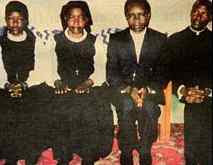 We’re continually on the lookout for existing resources on cults in East Africa. Recently I came across A. Scott Moreau's article on the Branham movement in the East Africa Journal of Evangelical Theology (April 1989). Moreau was a missionary in Africa and now serves as Professor of Intercultural Studies and Missions at Wheaton College and as editor of Evangelical Missions Quarterly. He writes:
We’re continually on the lookout for existing resources on cults in East Africa. Recently I came across A. Scott Moreau's article on the Branham movement in the East Africa Journal of Evangelical Theology (April 1989). Moreau was a missionary in Africa and now serves as Professor of Intercultural Studies and Missions at Wheaton College and as editor of Evangelical Missions Quarterly. He writes:Almost every Kenyan student at the Nairobi International School of Theology has had encounters with a Branhamite and found them to be extremely difficult to talk to without having to engage in a defense of the traditional Christian doctrine of the Trinity or of the baptismal formula “in the name of the Father, the Son, and the Holy Spirit.”Moreau first summarizes the history of the self-proclaimed prophet William Branham (1909–1965) and the movement that grew from his international healing ministry. Then he details the Branhamites’ core beliefs, especially that 1) while the Bible is inerrant, we need Branham’s gift of prophetic revelation to fully understand God’s message, and 2) God is not a Trinity; instead, the Father, Jesus, and the Holy Ghost are different manifestations of a single divine person. After mentioning several other doctrinal deviations, Moreau provides a basic evaluation of Branham’s ministry and teaching, concluding that Branham was a false prophet and his end-time message was in serious error. He concludes by classifying the Branhamites a theological cult and gives several suggestions for how to approach the movement’s followers.
There’s such a wealth of information in this brief article that I barely know where to begin. I especially appreciated Moreau’s practical emphasis. He wasn’t simply an academician dryly describing another religious group; he was an evangelical Christian on the front lines recognizing the need to more effectively engage this cult in Africa. For this Moreau deserves our sincere thanks.
Still, his article is twenty years old. Not only does this render his research somewhat outdated (William Branham Ministries is now deeply entrenched across the continent), but the lack of related research since then is a sad indication of how little has been done by serious theologians in East Africa to address harmful groups of this nature.
May God help us to build on the work of such scholars and equip East African believers with the tools and training they need to effectively refute those who follow false prophets—and share the true Gospel with them in love.

 This past Lord’s Day I had the privilege of worshiping with a church that’s considering supporting our ministry in Africa. While our family always enjoys fellowship with our home congregation, we’ve come to appreciate the opportunities that God brings to meet other church families. Why?
This past Lord’s Day I had the privilege of worshiping with a church that’s considering supporting our ministry in Africa. While our family always enjoys fellowship with our home congregation, we’ve come to appreciate the opportunities that God brings to meet other church families. Why?
 At the appointed hour the faithful gathered in the church to welcome their day of deliverance, perhaps not noticing that the doors and windows had been boarded up. In the midst of their singing and prayers, a loud explosion was heard, and fire ripped through the church.
At the appointed hour the faithful gathered in the church to welcome their day of deliverance, perhaps not noticing that the doors and windows had been boarded up. In the midst of their singing and prayers, a loud explosion was heard, and fire ripped through the church. One of the greatest obstacles to the missionary advance of the Mormon church in the 20th century was its notoriously racist view of Africans. Beginning with Brigham Young, generations of Mormon prophets and apostles characterized blacks as inferior and deformed (bearing the dreaded “mark of Cain”).
One of the greatest obstacles to the missionary advance of the Mormon church in the 20th century was its notoriously racist view of Africans. Beginning with Brigham Young, generations of Mormon prophets and apostles characterized blacks as inferior and deformed (bearing the dreaded “mark of Cain”).  VGR headquarters draws a stream of Branham followers from all over the globe. On the day I went, a local member brought along a friend from Nebraska so she could see the facility firsthand. Just going through VGR with them was educational; I saw how intently they listened to the guide as he summarized the various stages of Branham’s life and gazed with wonder at the pictures and paraphernalia on display. As a former Mormon, I couldn’t help but be reminded of the exaggerated devotion many Latter-day Saints pay to their founding prophet, Joseph Smith.
VGR headquarters draws a stream of Branham followers from all over the globe. On the day I went, a local member brought along a friend from Nebraska so she could see the facility firsthand. Just going through VGR with them was educational; I saw how intently they listened to the guide as he summarized the various stages of Branham’s life and gazed with wonder at the pictures and paraphernalia on display. As a former Mormon, I couldn’t help but be reminded of the exaggerated devotion many Latter-day Saints pay to their founding prophet, Joseph Smith. VGR displays (and actually uses) Branham’s original pulpit. His desk sits below a framed picture, along with sheets of his handwritten sermon notes. These and many other artifacts testify that, for his legions of devotees, Branham is much more than a gifted and anointed man; he’s God’s unique and final prophet, and one can be only be prepared for Christ’s return by believing and following his divisive “message.”
VGR displays (and actually uses) Branham’s original pulpit. His desk sits below a framed picture, along with sheets of his handwritten sermon notes. These and many other artifacts testify that, for his legions of devotees, Branham is much more than a gifted and anointed man; he’s God’s unique and final prophet, and one can be only be prepared for Christ’s return by believing and following his divisive “message.” It was deeply troubling to watch Branham’s disciples dispatch such vast quantities of false teaching from their distribution center. I watched in frustration as scores of pallets, filled with booklets, tapes, and other materials, were lined up and readied for shipment.
It was deeply troubling to watch Branham’s disciples dispatch such vast quantities of false teaching from their distribution center. I watched in frustration as scores of pallets, filled with booklets, tapes, and other materials, were lined up and readied for shipment.

